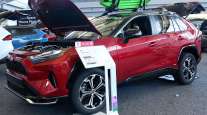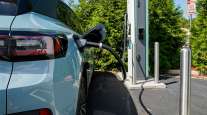Kenworth Developing Zero-Emissions Trucks Powered by Hybrid-Electric Powertrains

This story appears in the May 29 print edition of Transport Topics.
Kenworth Truck Co. is developing six low- or zero-emissions Class 8 trucks that will be used in a two-year trial at the ports of Los Angeles and Long Beach.
Five of the trucks, all of which are Kenworth T680 day cabs, will be powered by hybrid-electric powertrains, while one will feature a hydrogen fuel cell powertrain, according to Kenworth, a division of Paccar Inc.
The fuel cell truck and one of the hybrids will be ready for initial track and road testing in the fourth quarter of this year, the truck manufacturer said in a release. During the ports trial, which Kenworth told Transport Topics is slated to begin at the same time, the trucks will transport freight among the ports and warehouses and rail yards in the Los Angeles Basin area.
“These T680 day cab projects provide an excellent opportunity for Kenworth to develop and advance important technologies that may play a critical role in the trucks of tomorrow,” said Patrick Dean, the manufacturer’s chief engineer. “For example, California is considering regulations that will require zero-emission levels for port drayage trucks operating in specifically designated areas. We look forward to playing a leadership role to meet the opportunities and challenges ahead.”
Ballard Power Systems is supplying an 85-kilowatt fuel cell engine for the hydrogen-fueled truck. The engine will recharge the truck’s onboard lithium-ion batteries, which power a dual-rotor electric motor to drive the rear tandem axle through a 4-speed automated transmission.
According to Ballard and Kenworth, each truck will have an electric-only range of about 30 miles, while the onboard hydrogen or natural gas fuel will provide sufficient range for a full day in regional-haul applications.
“We see significant market interest in the complementary addition of fuel cell systems to address the range limitations of stand-alone battery solutions in certain use cases,” Rob Campbell, Ballard’s chief commercial officer, said in the release.
Rick Cameron, managing director for the Port of Long Beach, told Transport Topics that the project in part will look at the fuel cell truck’s range “as it relates to how far a truck can drive before needing to refuel, which goes back to a bigger question of refueling infrastructure at the ports.”
On fuel cells specifically, FTR analyst Noel Perry is skeptical. “There’s nothing in the underlying economics that would support the technology,” he told TT. [The project is] clearly an experiment justified by the desire to be innovative and the desire, more importantly, to have a lower emissions signature.”
Development of the first two trucks is supported by grants of $2.1 million for each project from the U.S. Department of Energy’s Office of Energy Efficiency and Renewable Energy, with Southern California’s South Coast Air Quality Management District as the prime applicant, according to Kenworth.
Kenworth will follow those trucks with four more natural gas hybrids to develop under a $4.8 million funding program from the California Air Resources Board. The truck maker will build the first of these units in 2018, according to Kenworth.



